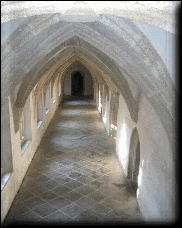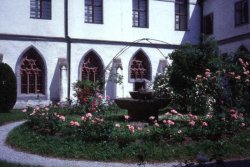Joseph II’s monasteries abolition
 Under Abbot Hermann Kurz (1767 – 1797) monasteries all over Bohemia and Moravia started to be abolished by Emperor Joseph II. The fate of the monastery of Vyšší Brod seemed to be sealed as well. In 1786, Abbot Hermann Kurz was removed from his position and sent to a fishing farmstead that belonged to the monastery. The monastery was supposed to last as long as the last monks were alive. At that time the monastic community numbered 65 members, then only 18 were allowed and new novices were prohibited. A secular priest from Třeboň was appointed to the monastery as a benefice abbot. The monastery property was partly divided and rented out. However, in 1789, the deposition of the abbot was cancelled by imperial edict and he was given back all his rights in 1790.
Under Abbot Hermann Kurz (1767 – 1797) monasteries all over Bohemia and Moravia started to be abolished by Emperor Joseph II. The fate of the monastery of Vyšší Brod seemed to be sealed as well. In 1786, Abbot Hermann Kurz was removed from his position and sent to a fishing farmstead that belonged to the monastery. The monastery was supposed to last as long as the last monks were alive. At that time the monastic community numbered 65 members, then only 18 were allowed and new novices were prohibited. A secular priest from Třeboň was appointed to the monastery as a benefice abbot. The monastery property was partly divided and rented out. However, in 1789, the deposition of the abbot was cancelled by imperial edict and he was given back all his rights in 1790.  Thus, though it suffered severe losses, the monastery escaped suppression. A remaining duty was to provide four, later five teachers, free of charge, for what was later to become a German grammar school in České Budějovice, or to pay 300 fl per teacher. The monastery at first preferred to pay. When the school was abolished in the monastery in 1815, the monastery still had to provide teachers for České Budějovice. Only after the First Republic of Czechoslovakia established (1921) were the monks freed from this obligation.
Thus, though it suffered severe losses, the monastery escaped suppression. A remaining duty was to provide four, later five teachers, free of charge, for what was later to become a German grammar school in České Budějovice, or to pay 300 fl per teacher. The monastery at first preferred to pay. When the school was abolished in the monastery in 1815, the monastery still had to provide teachers for České Budějovice. Only after the First Republic of Czechoslovakia established (1921) were the monks freed from this obligation.
